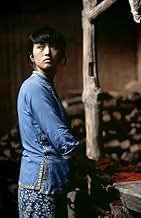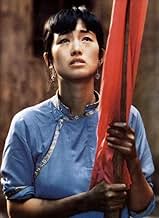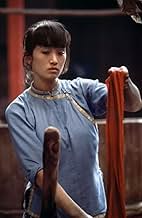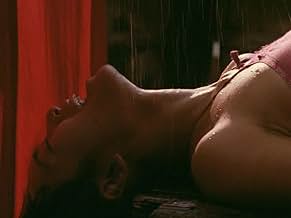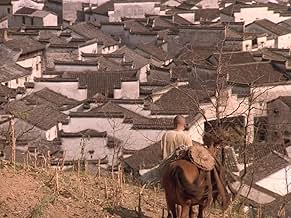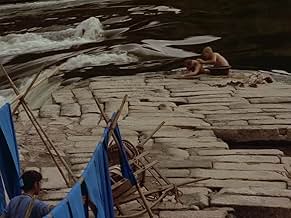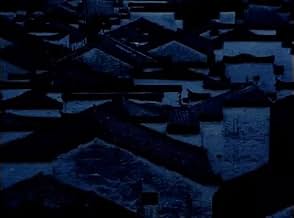CALIFICACIÓN DE IMDb
7.6/10
9.4 k
TU CALIFICACIÓN
Una mujer casada con el dueño brutal e infértil de una tintorería en China concibe un niño con el sobrino de su marido, pero se ve obligada a criar a su hijo como heredero de su marido sin r... Leer todoUna mujer casada con el dueño brutal e infértil de una tintorería en China concibe un niño con el sobrino de su marido, pero se ve obligada a criar a su hijo como heredero de su marido sin revelar su parentesco en esta tragedia circular.Una mujer casada con el dueño brutal e infértil de una tintorería en China concibe un niño con el sobrino de su marido, pero se ve obligada a criar a su hijo como heredero de su marido sin revelar su parentesco en esta tragedia circular.
- Dirección
- Guionista
- Elenco
- Nominado a 1 premio Óscar
- 8 premios ganados y 6 nominaciones en total
- Dirección
- Guionista
- Todo el elenco y el equipo
- Producción, taquilla y más en IMDbPro
Opiniones destacadas
'Ju Dou' is a fine example of cinema at its rawest. Director Zhang Yimou hardly makes any use of special effects, keeps the background score at a minimum, makes the sets look very real (they don't even look like movie-sets) and yet he avoids his movie to look like a documentary. He seems to have relied most on the camera and actors to do the work. Even though the film is set in the 20s, 'Ju Dou' was one of the most controversial movies in China and it was banned arguably due to the way a powerful elderly man was depicted, a woman rebelling against a man and/or the depiction of injustice towards women in China and preference for a male heir.
A natural beauty, Gong Li in her early days, plays the title role of a peasant girl who's sold to an evil old man. This couldn't have been an easy part for a young actress to play but Li makes it look otherwise. She is phenomenal to watch. Li Wei as the cruel master does a great job too and he adds a humanity to his character that makes us sympathize for him. Li Baotian, as the evil master's nephew with whom Ju Dou has an illicit relationship, is just as brilliant.
The cinematography deserves special mention and some of the visuals and sceneries of the Chinese landscape are breathtaking. The writing is very good as the film sticks to the main story (no subplots) and the characters are rich, even that of the child who doesn't say anything. 'Ju Dou' does tackle a lot of issues (which is perhaps why it was banned) that are displayed graphically or hinted specifically. Also there's a lot of irony in the story that beautifully works. For example how the impotent evil master was once so intimidating that he tortured his previous wives to death but how quickly this turns around after Ju Dou gives birth and later on he sees hope in the child and uses him to vindicate his helpless state but that too has consequences. Yimou presents it all without throwing it at the audiences face.
Apart from the aforementioned, there's a visually poetic feel about 'Ju Dou'. It's executed in a very artistic way. The way he shows the dye mill, (which looks like any other old overused mill), and then the colourful sheets of cloth make is dazzling to look at. Also the mountains and river are shot in such a way that they look like beautiful postcards. Then there's another shot of a beaten up Gong Li sitting next to a lantern while the flickering firelight reveals her sad face.
I found the ending a little too abrupt. Perhaps Yimou should have developed this. Lastly, Yimou's intentions seem honest in the way he tells the story. He does not go over the top by including melodrama or making it preachy nor does he make it too simplistic. It's one of his finest works and some might find it difficult to watch but in the end it's a fine work of art that tells a relevant story.
A natural beauty, Gong Li in her early days, plays the title role of a peasant girl who's sold to an evil old man. This couldn't have been an easy part for a young actress to play but Li makes it look otherwise. She is phenomenal to watch. Li Wei as the cruel master does a great job too and he adds a humanity to his character that makes us sympathize for him. Li Baotian, as the evil master's nephew with whom Ju Dou has an illicit relationship, is just as brilliant.
The cinematography deserves special mention and some of the visuals and sceneries of the Chinese landscape are breathtaking. The writing is very good as the film sticks to the main story (no subplots) and the characters are rich, even that of the child who doesn't say anything. 'Ju Dou' does tackle a lot of issues (which is perhaps why it was banned) that are displayed graphically or hinted specifically. Also there's a lot of irony in the story that beautifully works. For example how the impotent evil master was once so intimidating that he tortured his previous wives to death but how quickly this turns around after Ju Dou gives birth and later on he sees hope in the child and uses him to vindicate his helpless state but that too has consequences. Yimou presents it all without throwing it at the audiences face.
Apart from the aforementioned, there's a visually poetic feel about 'Ju Dou'. It's executed in a very artistic way. The way he shows the dye mill, (which looks like any other old overused mill), and then the colourful sheets of cloth make is dazzling to look at. Also the mountains and river are shot in such a way that they look like beautiful postcards. Then there's another shot of a beaten up Gong Li sitting next to a lantern while the flickering firelight reveals her sad face.
I found the ending a little too abrupt. Perhaps Yimou should have developed this. Lastly, Yimou's intentions seem honest in the way he tells the story. He does not go over the top by including melodrama or making it preachy nor does he make it too simplistic. It's one of his finest works and some might find it difficult to watch but in the end it's a fine work of art that tells a relevant story.
I have become a huge fan of Gong Li and have now purchased five films that she has appeared in. Ju Dou is by far her sexiest and most daring performance. She plays the lead character in the film named Ju Dou. She is a poor woman who is purchased by an old, impotent, and extremely cruel and abusive man who owns a Dye Factory. His name is Yang Jinshan. He wants to have an heir to succeed him but is having trouble getting his battered bride to conceive. At this juncture, his nephew, named Yang Tianqing, who is a mild mannered pervert who likes to be voyeuristic and watch his Uncle's new bride wash herself. Before he knows it, as the uncle is out on a trip, Ju Dou seduces him in one of the most erotic seduction scenes of all time. This is done in a very classy way, there is no nudity, but what is implied is quite obvious. In the aftermath of these proceedings, Ju Dou becomes pregnant and informs her "jackass" of a husband that she is going to give him a son. He is quite pleased and they end up naming the son, Yang Tianbi. Eventually the husband is crippled in an accident, and is later killed in an accident involving his son. For some odd reason, the son is as evil as can be and hates his mother and real Dad with a passion and proceeds with a plot to kill them. 2/3 of this movie is great. The last third in my opinion is that it is stupid. It is kind of like they tried to make Damien, The Omen, Part 4. The cinematography is excellent, but the last third of the movie was poorly done in my opinion. Like I said, this was Gong Li's sexiest role. She really has a way to express herself to the camera. However, the movie falls short of the mark.
This allegorical melodrama is most notable for its use of color: the film is mostly set in a small dye factory/household and the beautiful, brilliant colors of the dye are in stark contrast to the drabness of the building itself and the ugly lives that are lived there. Life is so ugly because household head Jin-shan is an impotent old man who has recently purchased an expensive young wife. Since he did purchase her, he feels it is his right to beat her every time he fails to perform sexually. Soon, his adopted son Tian-qing gets wind of his step-moms' nightly beatings and he begins to comfort her. It doesn't take much of this comforting to get her pregnant with a son that ends up being even more evil than Jin-shan himself, especially since young Tian-bai refuses to acknowledge Tian-qing in any way.
Characterizations are very slim here, most likely to ensure that the viewer doesn't try to look at the characters as anything more than allegorical stand-ins for a government so repressive that they banned the film for portraying an extramarital affair and so stupid that they didn't realize that the film is highly critical of their regime. Jin-shen is the stand-in for the government that treats its people as slaves and he's ironically aided by the ignorant Tian-bai who completely fails to understand the situation and is guided by a misplaced loyalty. Of course the ill-fated central couple is representative of the middle class people who understand the situation they are in but lack the power to change it.
The film works as an allegory but comes off as rather unengaging if taken literally since the characters aren't fleshed out. This is a particular problem with Tian-qing as he has numerous chances to better his situation but never acts rationally and Tian-bai who acts completely inhuman. Still, the direction and visuals are handled well enough to keep the film from being a mere exercise in didacticism.
Characterizations are very slim here, most likely to ensure that the viewer doesn't try to look at the characters as anything more than allegorical stand-ins for a government so repressive that they banned the film for portraying an extramarital affair and so stupid that they didn't realize that the film is highly critical of their regime. Jin-shen is the stand-in for the government that treats its people as slaves and he's ironically aided by the ignorant Tian-bai who completely fails to understand the situation and is guided by a misplaced loyalty. Of course the ill-fated central couple is representative of the middle class people who understand the situation they are in but lack the power to change it.
The film works as an allegory but comes off as rather unengaging if taken literally since the characters aren't fleshed out. This is a particular problem with Tian-qing as he has numerous chances to better his situation but never acts rationally and Tian-bai who acts completely inhuman. Still, the direction and visuals are handled well enough to keep the film from being a mere exercise in didacticism.
"Ju Dou" was made before "Raise the red lantern" (1991), the breakthrough movie of Zhang Yimou in the Netherlands, but released in the aftermath of the success of the last mentioned movie. There are similarities between the two films, but also big differences.
The similarities are that in both films a young woman is "bought" by an old wealthy man. In both films tensions arises when a male baby does not come soon.
In "Raise the red lantern" the older and earlier women of the rich man are still there, and the emphasis is on the jealousy and sneaky bullying of the women among themselves. In "Ju Dou" the former women of the rich men are already dead. The emphasis is on the hatred of the woman against her old husband and her extramarital affair with an adopted nephew of her own age.
With respect to this extramarital affair the openness with which sexuality is portrayed is remarkable for a Chinese film. There are even glimpses of exhibitionism. First the woman discovers that the nephew is peeping on her while bathing. Shocked at first it doesn't take long before she puts up a show to get the nephew excited. Later, when the old man is paralysed and immobile, the woman and the nephew make love to each other in a way that is clearly audible (and deliberately so) for the old man.
The main difference between "Ju Dou" and "Raise the red lantern" is however the use of color. Mostly grey in "Raise the red lantern", because the emotions (jealousy and sneaky bullying) are mostly subcutaneous. A feast of bright colors (the film is situated in a wool dyeing factory) in "Ju Dou" because the emotions (both the hatred for the old man as the passion for the nephew) are all consuming.
The similarities are that in both films a young woman is "bought" by an old wealthy man. In both films tensions arises when a male baby does not come soon.
In "Raise the red lantern" the older and earlier women of the rich man are still there, and the emphasis is on the jealousy and sneaky bullying of the women among themselves. In "Ju Dou" the former women of the rich men are already dead. The emphasis is on the hatred of the woman against her old husband and her extramarital affair with an adopted nephew of her own age.
With respect to this extramarital affair the openness with which sexuality is portrayed is remarkable for a Chinese film. There are even glimpses of exhibitionism. First the woman discovers that the nephew is peeping on her while bathing. Shocked at first it doesn't take long before she puts up a show to get the nephew excited. Later, when the old man is paralysed and immobile, the woman and the nephew make love to each other in a way that is clearly audible (and deliberately so) for the old man.
The main difference between "Ju Dou" and "Raise the red lantern" is however the use of color. Mostly grey in "Raise the red lantern", because the emotions (jealousy and sneaky bullying) are mostly subcutaneous. A feast of bright colors (the film is situated in a wool dyeing factory) in "Ju Dou" because the emotions (both the hatred for the old man as the passion for the nephew) are all consuming.
A very well done story about the illicit relationship between a man and his "aunt" in 1920's China that results in disaster for all concerned. I've seen Gong Li in a couple of movies recently, and it's clear that she is both beautiful and talented. Here she plays the title character of Ju Dou, a young woman forced into marriage to Yang Jinshan, the brutal and sadistic owner of a dye mill, who beats and tortures her, and also wants her to bear him a son and heir. The mill is also home to Yang Tianqing, Jinshan's adopted nephew. Ju Dou and Tianqing fall in love with each other, and have a child, who is assumed to be Jinshan's. The result is tragedy all around eventually.
The story is both unpleasant and yet interesting. Few of the characters (with the exception of Ju Dou) really connected with me. Ju Dou, on the other hand, becomes the object of sympathy right from the start. Her life is horrible, and even the relationship with Tianqing (a gentle and loving one for the most part) ultimately strikes me as unsatisfying, because frankly Tianqing is a wimp. The character (well portrayed by Li Baotian) comes across as childish and immature and afraid the whole way through. In a way, the most powerful (and frightening in many ways) character was the adolescent Tianbai, Ju Dou's son. He only appears in the last third of the movie or so, but he comes across as completely hateful toward both his mother and Tianqing and totally unemotional. It all leads up to a tragic (and yet appropriate) ending.
One thing I really enjoyed in this movie was the depiction of the rituals around Jinshan's funeral procession. That was quite fascinating. Overall, this was an unpleasant movie with many unpleasant or at least unlikable characters, but still quite interesting. 7/10
The story is both unpleasant and yet interesting. Few of the characters (with the exception of Ju Dou) really connected with me. Ju Dou, on the other hand, becomes the object of sympathy right from the start. Her life is horrible, and even the relationship with Tianqing (a gentle and loving one for the most part) ultimately strikes me as unsatisfying, because frankly Tianqing is a wimp. The character (well portrayed by Li Baotian) comes across as childish and immature and afraid the whole way through. In a way, the most powerful (and frightening in many ways) character was the adolescent Tianbai, Ju Dou's son. He only appears in the last third of the movie or so, but he comes across as completely hateful toward both his mother and Tianqing and totally unemotional. It all leads up to a tragic (and yet appropriate) ending.
One thing I really enjoyed in this movie was the depiction of the rituals around Jinshan's funeral procession. That was quite fascinating. Overall, this was an unpleasant movie with many unpleasant or at least unlikable characters, but still quite interesting. 7/10
¿Sabías que…?
- TriviaIn the original novel Tianqing is the biological nephew of Jinshan and the story itself is about incest by affinity. The makers of the film version decided not to use the incest angle, so in the film Tianqing and Jinshan are not biologically related.
Selecciones populares
Inicia sesión para calificar y agrega a la lista de videos para obtener recomendaciones personalizadas
- How long is Ju Dou?Con tecnología de Alexa
Detalles
Taquilla
- Total en EE. UU. y Canadá
- USD 1,986,433
- Fin de semana de estreno en EE. UU. y Canadá
- USD 10,300
- 10 mar 1991
- Total a nivel mundial
- USD 1,986,433
Contribuir a esta página
Sugiere una edición o agrega el contenido que falta


